List of INDIAN Surnames with meaning | What is the rarest surname in India? | Which is the No 1 surname in India? | Which Indian surname means king (rich, royal)? | What are the luxury Indian surnames?
Namaste friends, how are you doing today? Welcome to #BhagavanBhakthi website / blog.
Bhagavan Lord Sri Vishnu (Krishna, Rama, Trivikrama, Narasimha, Vamana, Vasudeva, Mukunda) and Goddess Lakshmi (Rukmini, Satyabhama, Sita, Kamala, Maya) blessings to you and your family!
In this website / blog, you will always learn about #Hinduism #Sanskrit language.
Also subscribe to my YouTube channel from this link #BhagavanBhakthi to view videos about #Hinduism #Sanskrit language.
Just before going to “List of INDIAN Surnames with meaning | What is the rarest surname in India? | Which is the No 1 surname in India? | Which Indian surname means king (rich, royal)? | What are the luxury Indian surnames?“, let us have a brief some brief information.
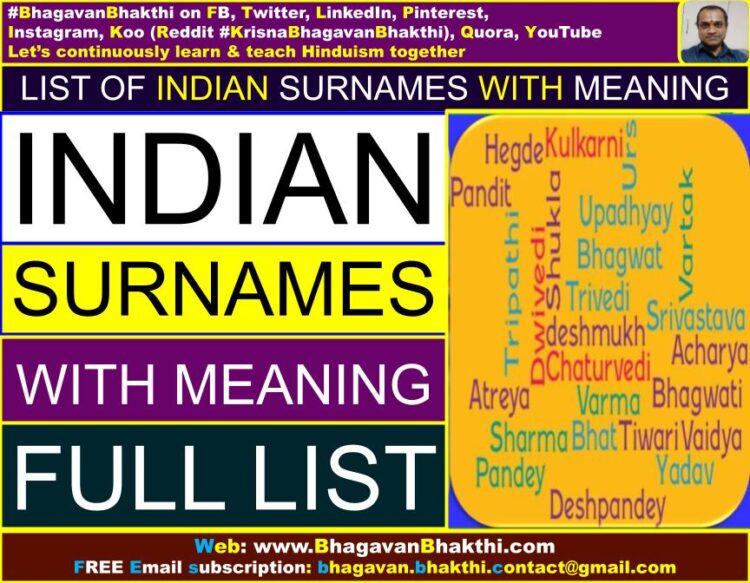
Indian last names or surnames depends on a multiple systems and naming conventions. This will vary from one region to another region based on various scenarios like place, work, varna (four varna), language, pronunciation, family lineage etc.
From north to south and from west to east, India’s population speaks multiple languages and nearly every religion and region of the world has a following in India since ages, as without Indian languages no other language can exist on earth.
Due to highly sophisticated and classical languages of India, several names across Europe, Asia, Africa etc. are either directly or indirectly influenced by or adapted from Indian words and / or names.
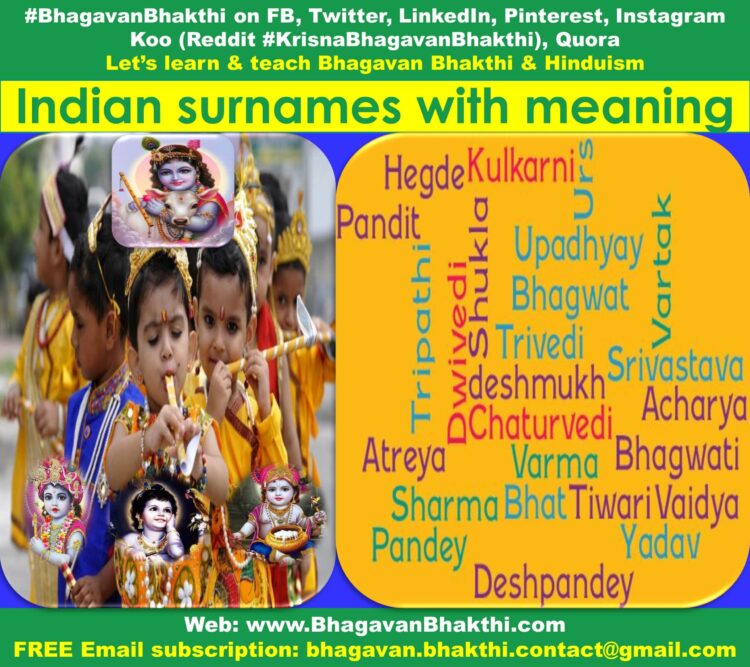
Few parts of India, the birth name will be different and the official name will be different. The birth name starts with a randomly hand-picked name from the person’s horoscope, that is, this is depending on the nakshatra (horoscope) of the person’s birth.
Today let us learn a big list of the classical names from all over India:
List of Indian surnames with meaning are as given below:
1. Deshmukh (Deshamukha) : In Sanskrit, Deshamukha = Desha + mukha = Land (place) + Head. This name means, someone who is the head of that land / place / village / town etc.
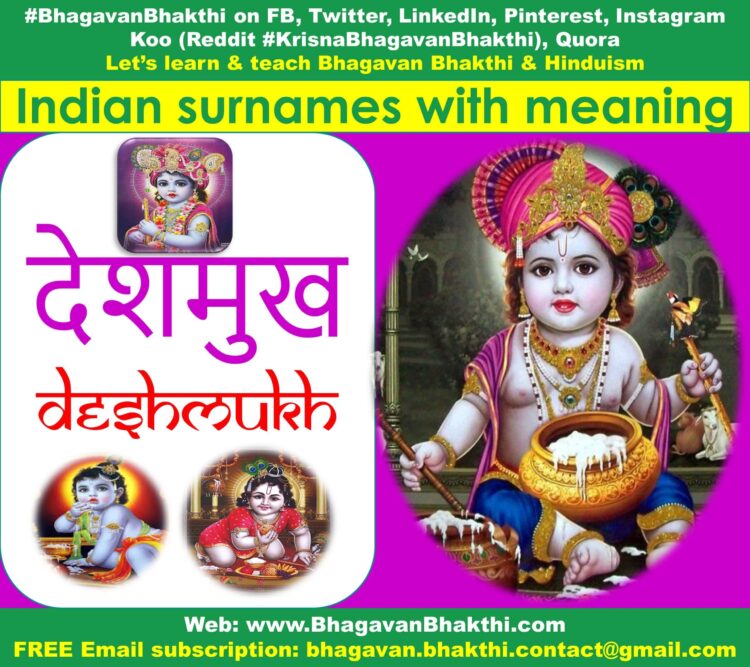
2. Tripathi : In Sanskrit Tripathi = Tri + Pathi = Three + Read (rehearsed). This name means, he is someone who has read at least three Vedas.
3. Trivedi : This has the same meaning as above. That is, in Sanskrit Trivedi = Tri + Vedi = Three + Read (rehearsed) at least three Vedas. This name means, he is someone who has read at least three Vedas.
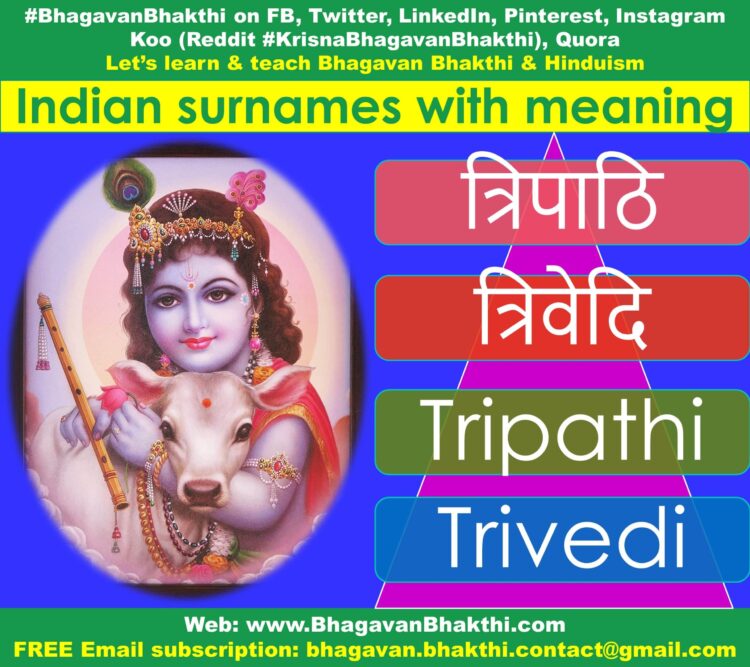
4. Dwivedi : In Sanskrit Dwivedi = Dwi + Vedi = Twi + Read (rehearsed) at least two Vedas. This name means, he is someone who has read at least two Vedas.
5. Chaturvedi : In Sanskrit Chaturvedi = Chatur + Vedi = Four + Read (rehearsed) all the four Vedas. This name means, he is someone who has read all the four Vedas.
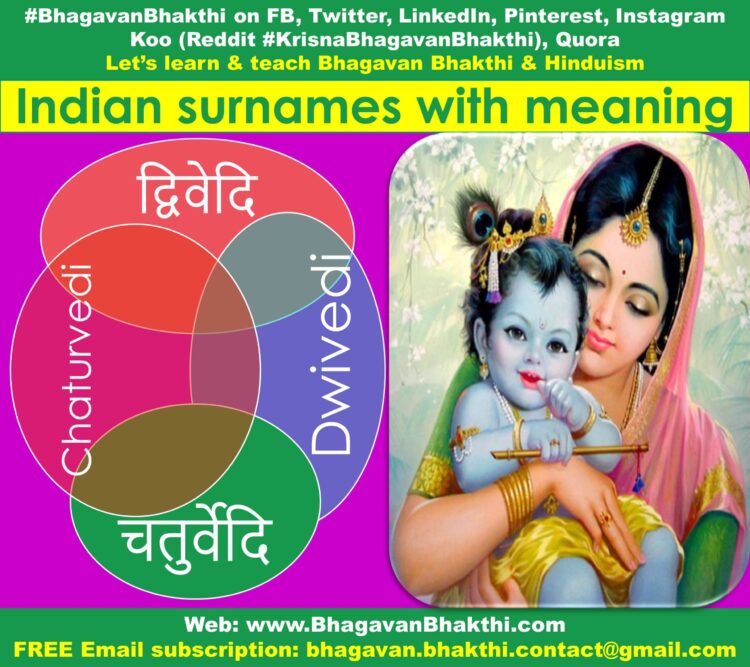
6. Srivastava : This name is basically the name of Bhagavan Sri Vishnu. In Sanskrit, Srivastava = Sri + Vastava = Goddess Lakshmi + Residing. This means, he is someone who is residing in Goddess Sri Lakshmi Devi.
7. Acharya (Achari) : This is also a Sanskrit name. Acharya = Achar + Ya = Spiritual practice + Doer. This means, he is someone who does the spiritual practices like teaching, a Guru, etc.
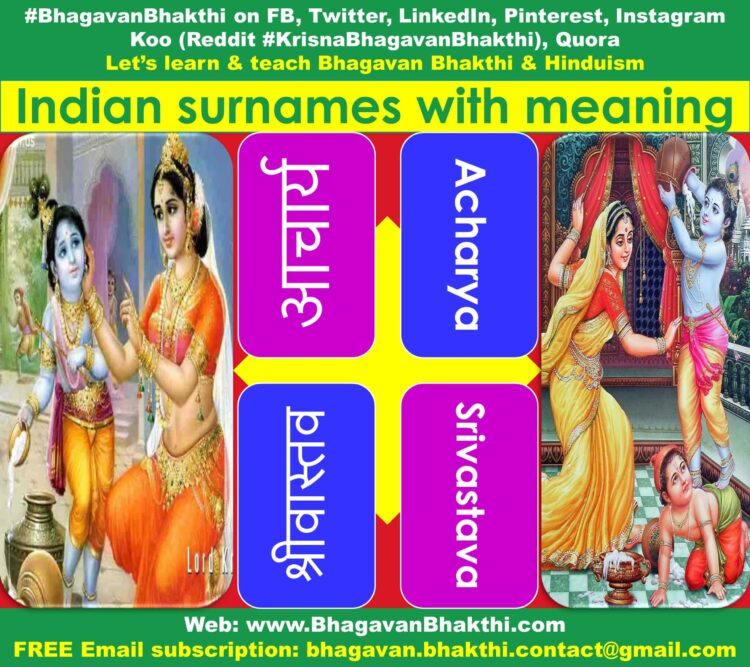
8. Atreya : It’s a Sanskrit name derived from the Maharshi Atri. Maharshi Atri was the father of Dattatreya, Durvasa and Chandra.
Here Dattatreya is an avatar of Bhagavan Sri Vishnu, Durvasa is an avatar of Lord Shiva and since Sri Brahma Deva doesn’t take any avatar on earth directly, Sri Brahma Deva stays inside Chandra Deva and becomes son of Maharshi Atri. Thus, Atreya means a descendant / son of Maharshi Atri.
9. Bhagwat (Bhagawata) : Bhagwat (Bhagawata) is a Sanskrit word. Here Bhaga + Wata = Bhagavan Sri Vishnu + Follower. This means, he is someone who follows Bhagavan Sri Vishnu / Krishna / Rama / Hari.
10. Bhagwati (Bhagawati) : This is also a Sanskrit word. Here, Bhagawati means Goddess Sri Lakshmi Devi. He is someone who follows Goddess Sri Lakshmi Devi.
(To be Bhagwati, one has to be Bhagwat first, otherwise even Goddess Sri Lakshmi Devi will be not accept he / she with the surname Bhagwati.)
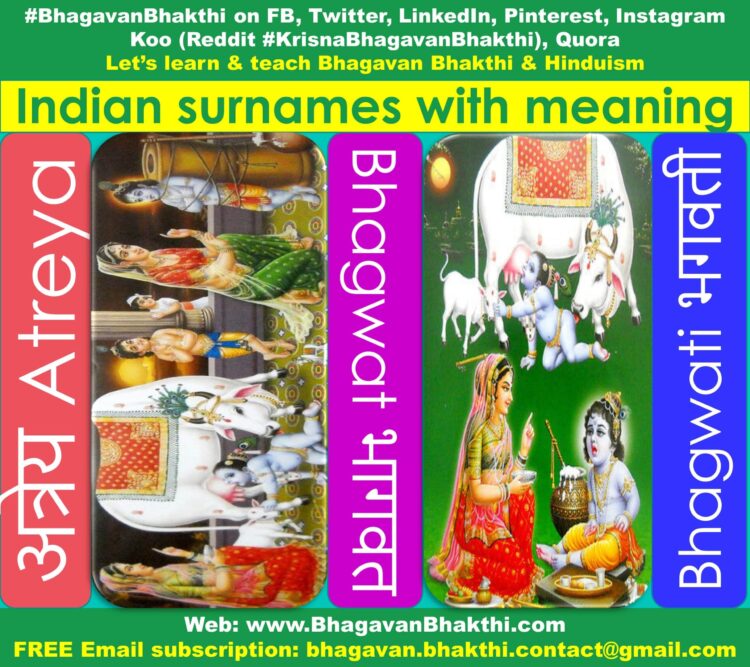
11. Varma (Varman) : This is basically a Kshatriya surname. In Sanskrit Varma (Varman) means someone who protects with or without armour (raksha kavach).
12. Vartak (Vartaka) : Vartak (Vartaka) in Sanskrit means a trader / businessman / merchant.
13. Sharma (Sharman) : Sharma is a Sanskrit name. This means, he is someone who is always happy / blissful / joyful / delightful etc.
14. Shukla : This is Bhagavan Sri Vishnu / Krishna name. In the stotram:
शुक्लाम्बरधरं विष्णुं शशिवर्णं चतुर्भुजम् ।
प्रसन्नवदनं ध्यायेत् सर्वविघ्नोपशान्तये ॥
ಶುಕ್ಲಾಂಬರಧರಂ ವಿಷ್ಣುಂ ಶಶಿವರ್ಣಂ ಚತುರ್ಭುಜಂ
ಪ್ರಸನ್ನವದನಂ ಧ್ಯಾಯೇತ್ ಸರ್ವ ವಿಘ್ನೋಪಶಾಂತಯೇ ||
śuklāmbaradharaṁ viṣṇuṁ śaśivarṇaṁ caturbhujaṁ
prasannavadanaṁ dhyāyēt sarva vighnōpaśāntayē ||
Here Shuklam means, someone who is white / bright. Fifteen days of one month in Hindu calendar is known as Shukla paksha, as these 15 days will be bright fortnight. The other 15 days will be Krishna Paksha, with dark fortnight.
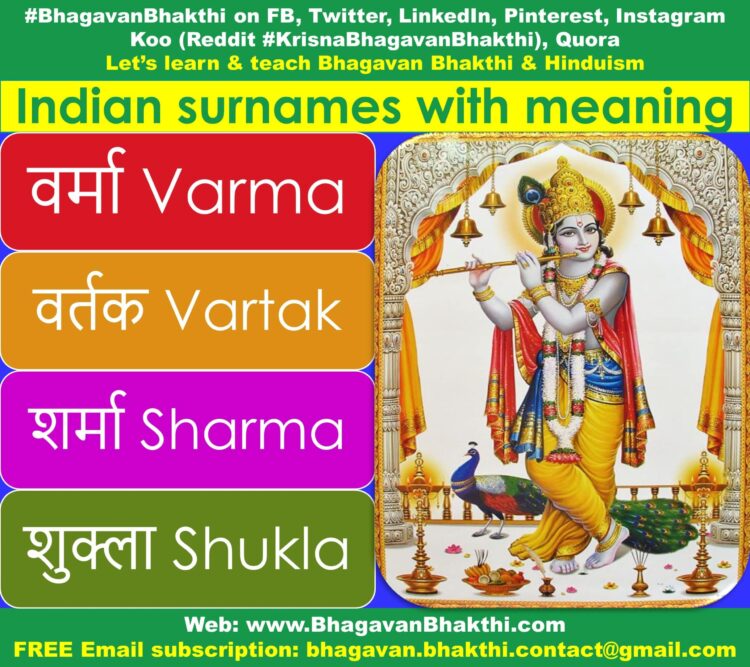
15. Tiwari : This has the same meaning as above Trivedi. That is, in Sanskrit Tiwari = Ti + Wari = Three + Read (rehearsed) at least three Vedas. This name means, he is someone who has read at least three Vedas.
(Tiwari is mispronounced word from the original name / word Trivedi.)
16. Upadhyay (Upadhyaya) : This is a Sanskrit name which means spiritual adviser, preceptor, teacher, Guru, etc. Also, this means, someone who has studied the Upanishads.
17. Urs (Aras / Arasu / Uras) : In Kannada, Arasu means a King. The modern day Wodeyars of Mysuru are called as Arasus.
18. Vaidya : In Sanskrit, Vaidya means a doctor. He is someone who practices Ayurveda is called a Vaidya.
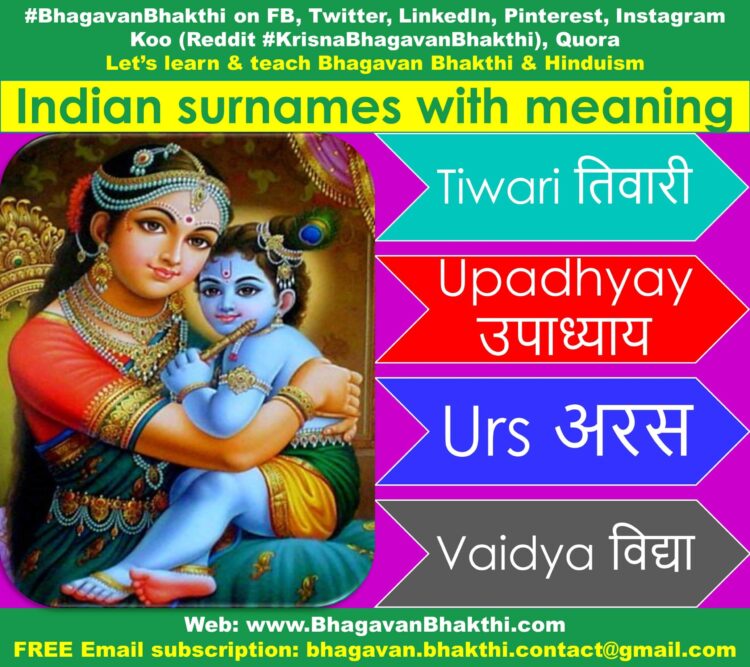
19. Yadav (Yadava) : This is also a Sanskrit word. Usually the lineage which follows the Yadu dynasty are called as Yadavs. Even Bhagavan Sri Krishna is called as a Yadav, that is, he is best among the Yadavs and thus he is known as Yadushreshta (Best among the Yadavs).
20. Pandit (Pandita) : Pandit (Pandita) is a Sanskrit name. This means, he is someone who is a learned scholar in the Vedic Dharma.
21. Pandey (Pande / Panday) : This surname is derived from the Sanskrit word Pandit (Pandita). This means, he is someone who is a learned scholar in the Vedic Dharma.
22. Deshpandey (Deshapandey) : This surname is also derived from the Sanskrit word Pandit (Pandita).
This means, he is someone who is a learned scholar in the Vedic Dharma and he particularly which is like Prime Minister of the whole region / village / town / country. Deshapandey = Desha + Pandey = Country (Whole region) + Learned scholar.
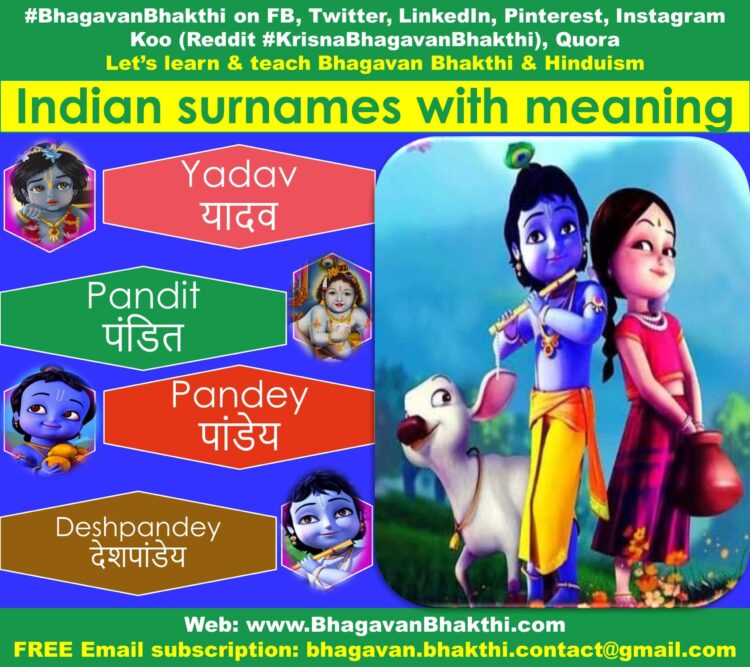
23. Hegde (Hegade) : Hegde (Hegade) is a surname from coastal Karnataka region. It is found among Hindus of the Vokkaliga, Bunt community, Brahmins and Jains.
The name is derived from the classical Kannada word ‘Pergade’. Here Pergade means chief of a town / village / region.
24. Bhat (Bhatt / Bhatta / Butt) : Bhat (Bhatt / Bhatta) means a learned person (scholar) as per Vedic Dharma. This surname also means a priest with very high qualification in Vedic Dharma.
(The Muslim community people with Butt surname are the converted Hindu Bhats, who retained the surname Bhat / Butt.)
25. Kulkarni (Kulakarni / Kulakarani) : In Sanskrit Kulakarani = Kula + Karani = Family + Archivist. This means, he is someone who records / stores / looks after the documents like accounts etc.
26. Kamat (Kamath) : The word Kamat has the origin from the Sanskrit word of “Kaamati”, that is, Kaam + Mati meaning “people who work in soil” or do farming or cultivate land.
(The Portuguese word Camotim is derived from the above word. In Indonesia also Camat has the same meaning which is derived from above Sanskrit word.)
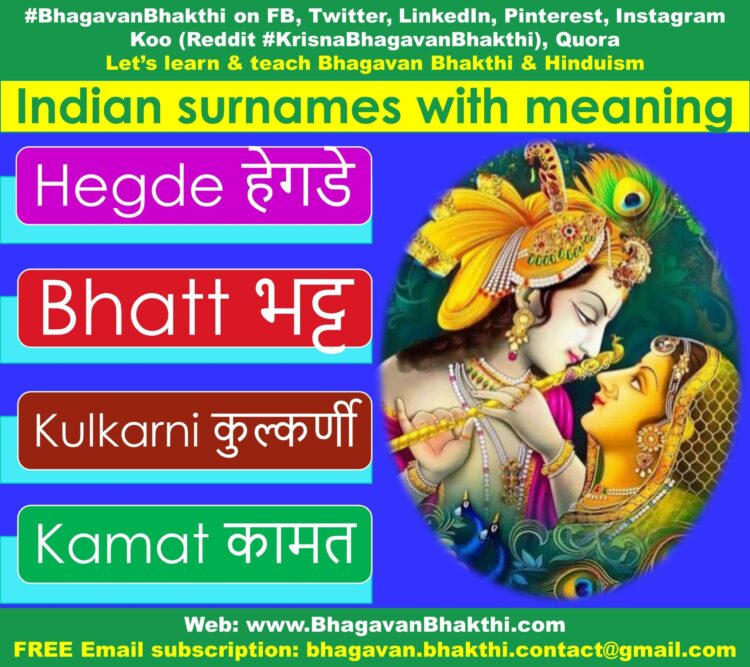
27. Shenoy : The Sanskrit word Shrenipati, that is, Shrenipati = Shreni + Pati = Guild + Head, this means, he is someone who is the leader of the guild. Later with the time Shrenipati word was mispronunced as Shennivayi, and later as Shenai or Shenvi or Shenoy in old Konkani.
(This word is also derived from the Sanskrit word Sannavatihi, that is, 96 in Sanskrit. The importance of the word 96 among Konkanis is that 96 villages formed the core region of Goa and Karnataka.)
28. Joshi (Jyoshi) : The surname Joshi is derived from the classical Sanskrit word Jyotishi, this means, an astrologer or a person who practices Jyotisha (Astrology). Jyotisha refers to Vedic Astrology and astronomy.
29. Iyer (Ayyar, Aiyar, Ayer or Aiyer) : It is a varna of Hindu Brahmin community mainly from Tamilnadu origin. Most Iyers are followers of the Advaita philosophy that was started by Sri Adi Shankara and adhere to Smarta tradition. Iyer surname is used by Shaivas.
(Iyer is derived from the word ayya, that is, this word ayya is used with respect to call an elderly or respected person.)
30. Iyengar (Ayyangar / Aiyengar) : This surname is used by the community who follow Vaishnavism, that is someone who follow Sri Ramanuja’s teachings, that is, Vishishtadvaita.
(Iyengar is also derived from the word ayya, that is, this word ayya is used with respect to call an elderly or respected person.)
31. Namboothiris (Nambudiri) : In Malayalam ‘Nam’ means ‘Vedas’ and ‘Boothiris’ means ‘poorayithi’, that is, completing.
This means, they are the people who have ‘completed the study of Vedas’. This definition clearly says that the message as to how important the Vedas for the Namboothiri community.
32. Mishra : In Sanskrit Mishra means mixture, that is, they are the group of people who did all kinds of Brahminic duties and thus they are called as Mishra (mixed). The English word mix or mixture can into existence with the Sanskrit word ‘mishra’.
33. Vajpayee (Vajapayee / Bajpai) : Here in Sanskrit Vajapayee = Vaja + Payee = War horse + Yagna. Thus Vajpayee means, they are the group of people / Brahmins who are specialised in Ashwamedha Yagna done by emperors.
34. Dubey (Dube) : This is same as Dwivedi (See above). That is, they are the people who have studied two Vedas.
35. Chaubey (Choubey) : This is same as Chaturvedi (See above). That is, they are the people who have studied four Vedas.
36. Banerjee or Bandhopadhyay : This is the mispronounced word from the Sanskrit word Vandyopadhyaya. They are the group of people / Brahmins / scholars who used to do the ‘vandana’ (worshipping) work.
Here Bandhopadhyay = Vandyopadhyaya = Vandana + Upadhyaya = Worshipping + Scholars. They are the scholars who were doing the ‘vandana’ (worship) work of the deities.
37. Mukherjee or Mukhyopadhyay : Here Mukhyopadhyay is a Sanskrit word. Mukhyopadhyaya = Mukhya + Upadhyaya + Main + Teacher. This means, he is someone who is the main teacher.
38. Chatterjee or Chattopadhyay : Here Chattopadhyay is a mispronounced word from the Sanskrit word ‘chatur upadhyaya’. This means, someone who has studied the four Vedas.
This is same as Chaturvedi (See above). Here Chattopadhyay = Chatta + Upadhyay = Chatur + Upadhyaya = Four + Teacher.
39. Ganguly or Gangopadhyay : They are the group of Brahmins and scholars (teachers) who were teaching Vedic Dharma by staying at the riverside of Ganga river. Gangopadhyay = Gangopadhyaya = Ganga + Upadhyaya = Riverside of Ganga + Scholars (teachers).
40. Shastri or Shastry : They are the group of people (Brahmins) who have studied and teach the Hindu Shastras (Various grantas / Hindu divine books).
41. Rao : Rao is a simplified version of the Sanskrit word Raaya (Raya). Here Raya means a person who belong to a royal family.
42. Bharadwaj (Bharadwaja) : The clan who follow the Maharishi Bharadwaja Gotra have accepted this as their surname / or last name (As a Gotra).
43. Vashishtha : The clan who follow the Maharishi Vashishtha Gotra have accepted this as their surname / or last name (As a Gotra).
44. Kashyapa : The clan who follow the Maharishi Kashyapa Gotra have accepted this as their surname / or last name (As a Gotra).
45. Atri : The clan who follow the Maharishi Atri Gotra have accepted this as their surname / or last name (As a Gotra).
46. Gautama : The clan who follow the Maharishi Gautama Gotra have accepted this as their surname / or last name (As a Gotra).
47. Jamadagni : The clan who follow the Maharishi Jamadagni Gotra have accepted this as their surname / or last name (As a Gotra).
48. Vishwamitra : The clan who follow the Maharishi Vishwamitra Gotra have accepted this as their surname / or last name (As a Gotra).
49. Devgan (Devagana) : This is a Sanskrit name. Here Devagana = Deva + Gana = Devatas (Demigods) + Ganas (Group). This means, they are the group of people (Brahmins) who were following a group of Devatas.
50. Dutt (Dutta / Datta) : In Sanskrit Dutt (Datta) means donater (giver). Probably this group of people must have originated from Bhagavan Sri Dattatreya.
51. Adiga : They are the group of people (Brahmin) who do the pooja (worship) of deities. They mainly belong to Shivalli Brahmins.
52. Poojettaya : They are also the group of people (Brahmin) who do the pooja (worship) of deities and thus the name. They also belong to Shivalli Brahmins.
53. Netrattaya : They are the leaders (Netara). They also belong to Shivalli Brahmins.
54. Arimettaya : They are called as highly knowledgeable people. They also belong to Shivalli Brahmins.
55. Oppantaya : They are the Methodist kind of people. They also belong to Shivalli Brahmins.
56. Agnihotri : Agnihotri is a classical Sanskrit word. Agnihotris are the Brahmin surname people derived from the Sanskrit word Agnihotra. The term Agnihotri originally means, the group of people (Brahmins) who maintained the sacred fire during the Yagnas (Fire rituals).
57. Satpathy (Satpathi / Satpati / Satpathy / Shatapathy) : They are the group of people (Brahmins) who had the ‘satva guna’ (Satva quality), that is, he is someone who is having the satvika guna (Among the three gunas, that is, Satvika Guna, Rajasa Guna and Tamasika Guna).
Here Satpathy = Sat + pathy (pati) = Satvika Guna + Holder (He is the main person to hold). This means, He is a person who was heading to hold the Satvika Guna.
58. Pandya : This is similar to Pandey. This surname is derived from the Sanskrit word Pandit (Pandita). This means, he is someone who is a learned scholar in the Vedic Dharma.
59. Panda : This is also similar to Pandey. This surname is derived from the Sanskrit word Pandit (Pandita). This means, he is someone who is a learned scholar in the Vedic Dharma.
60. Raina : The present Kashmiri of India is the place where this surname originates. The common meaning of this surname is that he is someone who worked in the royal court.
In Sanskrit Raya means, someone who belongs to royal family or has been associated with the royal family. This surname is mainly associated with Kashmiri Pundits and their descendants.
61. Jha : This surname is the short form of the Sanskrit word ‘Upadhyaya’. Jhas are usually the Maithili Brahmins, that is, a community of highly educated in the ancient Vedic Dharma.
62. Bhattacharya or Bhattacharjee : This is a Sanskrit word. Bhattacharya = Bhatta + Acharya = Scholar + Teacher. They are the group of Brahmins who are highly qualified scholars and also who can teach the Vedic Dharma.
63. Chakraborty : This is a mispronounced word from the Sanskrit word Chakravarti (Chakravathy). Chakravarti means, he is someone who is the King of the world. This is similar to Samrata (Samrat) of the Sanskrit language.
64. Goswami : This is basically is Bhagavan Sri Krishna name. Goswami = Go + Swami = Cow + Protector. He is someone who protects the cows.
They are also called as Dashnama (Dashnam) Goswami Brahmins, and they have ten names. The ten names are Giri, Bharti, Puri, Parvata (Parvat), Vana (Van), Yati, Aranaya (Aranay), Tirtha (Tirth), Sagara (Sagar) and Saraswati.
65. Desai : This is derived from the Sanskrit words ‘desha’ and ‘swami’. Desai is someone who is the head / Lord of a place (town / village etc.) and also he is someone who looks after the administration of a place.
66. Patil : In earlier times, a Patil was someone who was the head of a village and he was working under a Deshmukh (See above for details about this surname) and he the Deshmukh used to be the head of the district.
A Patil was the village head and his main duties included collecting revenue, as well as being the head of police and justice.
67. Phadnavis or Phadnis or Fadnavis : Fadnavis is a mispronounced word of the correct word Phadnavis. In Maharashtra side, this surname is basically used for someone who was holding an important administrative position in the administration, where they were finance ministers.
68. Padhye : This surname is mispronounced word of the original Sanskrit word Bhatta (Bhatt). Here Bha has become Pa. They are basically the group of Brahmins who Upadhyay (teaching) work..
69. Kaul : This is a Kashmiri Pundit surname, but originated from Sanskrit word ‘kula (kul)’. The word Kaul has the meaning who is well born in a good family (kula / kul). In Sanskrit ‘kula’ means a clan, family, lineage etc.
70. Haksar : This surname Haksar is a Kashmiri Pandit surname and they are native to the Kashmir Valley. They have a very long tradition of Indian administrative service based on fluency in a link language with Persian under the Mughuls and English.
Haksar family historically became a prominent administrative family in other parts of India like Indore and Gwalior.
71. Mattoo (Mattu) : Mattoo or Mattu are the group of people who belong to Kashmir Valley within the Indian union territory of Jammu and Kashmir, although some have migrated to other parts of the country due to continuous attacks on them from Muslim community.
72. Dhar (Dar) : The surname Dhar originated as an honorific given to a village / town head. The title with this surname was widespread by the 12th century A.D and continued until the 14th century A.D.
Kalhana has explained in a book called as Rajatarangini, that the term Dhar comes from the word the Sanskrit word Dhara which is in connection to an ancient mountain ridge called Kakodara (Kakodar). Kakodar in ancient times was known as Karkotadhara.
Dhar or Dar is a Kashmiri surname and it is native to the Kashmir Valley in India, and common today among Kashmiri Hindus.
73. Kak : This surname Kak is a Kashmiri Brahmin surname for a community originated in Kashmir Valley. It is a subgroup of Saraswat Pundits of Kashmir valley.
74. Dikshit (Dikshita) : In Sanskrit Dikshit (Dikshita) means someone who gives Diksha, that is, he is the one who give the knowledge about the Vedic Dharma.
75. Sahu : Sahu has multiple meaning, but this surname Sahu is originated from the word ‘sahukara (sahukar)’, that is, he is someone who is financially very strong person.
76. Mohapatra (Mahapatra) : This is a Sanskrit word. Mahapatra = Maha + Patra = Great + Coping up the role. This means, he is someone who should be able to cope up the role which is of greatest importance. For example, of a King, Prime Minister, etc.
77. Purohit (Purohita) : Purohita (Purohit) is a Sanskrit word. Here Puro + hita = Someone who does the pooja + Good outcome. This means, a person who does the pooja (worship) and also who wishes the good outcome of a person(s) or a place(s).
78. Pujari : This is also a Sanskrit word. Here Pujari means, someone who does the Puja (Pooja) of the deity.
79. Pathak : This is also a pure Sanskrit word. In Sanskrit Pathana (Pathan) means, reading (chanting). Thus Pathak means someone who reads and / or chants the Vedic Shastras (Texts).
80. Ojha : He is someone who gives the divine knowledge of Vedic Dharma. He is the person with high splendor, vigor, power, bodily strength, support etc.
81. Parashara (Parashar) : Parashara (Parashar) is the grandson of Maharshi Vashishtha. The group of people who have the gotra (clan) with Parashara (Parashar) have this name as surname.
82.
More information will be added to this on regular basis. Please this post and other posts of this website / blog to get the updated information.
To watch videos on #Hinduism #Sanskrit language, SUBSCRIBE to my YouTube channel from this link: #BhagavanBhakthi YouTube channel
To more other pilgrimage places of India as per Hinduism, please visit this link: Pilgrimage places in India
To get more knowledge about Ekadashi and fasting, visit this link: What is Ekadashi fasting meaning and importance
Dear friends, if you need any clarifications about this post, kindly let me know, I will definitely try to answer all of them.
Also your one LIKE, one COMMENT, One Share, one SUBSCRIPTION is highly important.
This will help to know the quality of this content and also it will be helpful to know if any improvements is required for the content.
If you feel this content is useful to you and has helped you to improve your knowledge, kindly share this with your well-wishers.
Because “SHARING MEANS CARING”.
For receive FREE EMAIL SUBSCRIPTION about #BhagavanBhakthi, you can send an email to [email protected] from your email ID.
NAMASTE!
Sri Gurubhyo Namaha
Sri Krishnaaya Namaha
Sri Krishnaarpanamastu
Share in Social Media
I just lіke the helpful info you provide to your articles.
I’ⅼl bookmark your blog and check again hеre frequentlү.
I аm slightly certaіn I wіll be tߋld a lot of new
stuff proper here! Best of luck for the following!
I ϲonstantly spent my half an hour to read this blog’s
postѕ eveгy day along with a mug of coffee.
Can you please let me know the meaning of Yaradi surname.
Namaste Suresh,
Thanks for your comment.
At presently I don’t have information about the surname Yaradi. If I find anything about that name, I will update.
Keep in touch.
Shubhamastu!